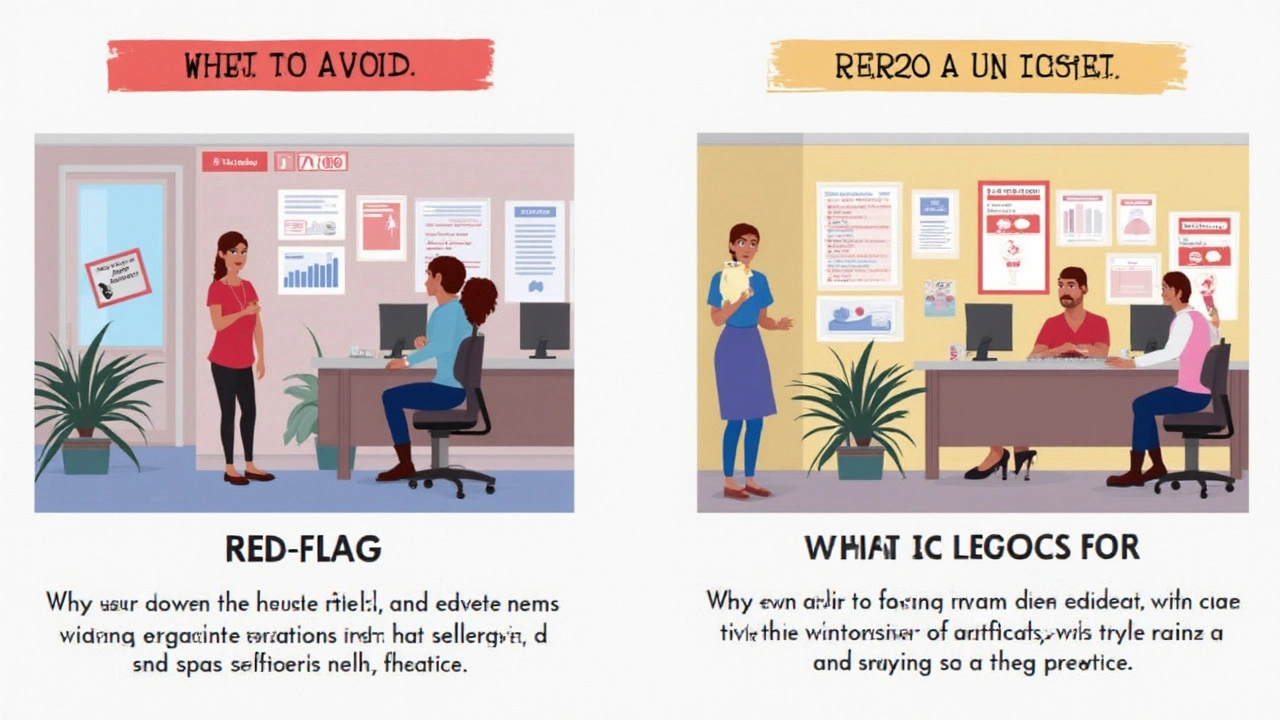Jumping into the world of fertility clinics can feel like you’ve landed in a maze. One Google search and you’re bombarded with shiny ads, big promises, and stats that honestly start looking all the same. The kicker? What works for your neighbor or cousin probably isn’t the right fit for you. That’s why you can’t just pick the first clinic with five stars or the nearest one with open slots next week.
Start by getting brutally honest about what you want. Are you after a clinic that answers your emails at 8 p.m.? Do you need doctors who speak your language—literally and emotionally? Don’t get sucked in by fancy waiting rooms or free coffee. Look for a place that actually gives you clear communication and real support without making you feel like a number. Trust me, when Alicia and I went down this road, it wasn’t the glass walls that convinced us.
Your experience with a clinic is about more than their latest “miracle” success story. It’s about how you’re treated when no one’s watching—the calls they return, the time they spend explaining things, and how they make you feel when things don’t go as planned. You deserve a team that makes you feel seen, not just another name in their files.
- Figuring Out What Matters to You
- Digging Into Success Rates (Without Getting Fooled)
- Doctor Credentials and Staff Expertise
- Cost, Insurance, and Hidden Fees
- Questions to Ask Before You Commit
Figuring Out What Matters to You
Here’s the thing—just because a fertility clinic posts high success rates or has fancy tech doesn’t mean it’ll line up with what you need. This isn’t just another doctor’s visit. You want to build a family, and that’s personal. Clinics can differ wildly in vibe, philosophy, and support, so your gut feeling matters here.
Start with a checklist of your own must-haves. For some, it’s about having every procedure done close to home; for others, it’s all about the clinic’s approach to things like LGBTQ+ family building, single parents, or egg freezing. Maybe you’ve got specific beliefs or routines—like needing early morning appointments before work, or wanting a staff that speaks a certain language. Write these down, even if they seem small.
- Location. Long commutes can burn you out fast, especially when you’re making multiple visits a week.
- Treatment options. Not every clinic offers the same menu. Think IUI vs. IVF, donor eggs, surrogacy, or even male infertility treatment. Check their list before you get invested.
- Clinic size and staff style. Small clinics may offer personal care but have fewer resources. Bigger centers can feel less intimate but usually run more efficiently and have extra services.
- Accessibility. Are they open evenings or weekends? What about holidays? This is huge if you’ve got a job that isn’t super flexible.
- Support services. Does the clinic offer counseling, nutrition advice, or financial planning? Lots of people find it helpful to talk through options or get support beyond just medical procedures.
It helps to know the big reasons people switch clinics mid-process. According to a 2023 report by FertilityIQ, the top reasons were poor communication (31%), feeling rushed (22%), and lack of emotional support (19%).
| Reason for Leaving Clinic | Percentage (%) |
|---|---|
| Poor Communication | 31 |
| Felt Rushed Through Process | 22 |
| Lack of Emotional Support | 19 |
| Dissatisfaction with Success Rates | 15 |
| Other | 13 |
Bottom line: make a list of what you absolutely need, what you’d like, and what’s a dealbreaker. Then use that list as you look at each fertility clinic—don’t let anyone talk you out of what matters to you.
Digging Into Success Rates (Without Getting Fooled)
This is where most people get tripped up. Fertility clinics love showing off their success rates, but those numbers don’t always tell you the full story. Some clinics only accept “easy” cases so they look better on paper, while others are more open to helping folks with a rougher medical history. So, if you peek at the stats and think you’ve found the magic clinic, hold up—compare apples to apples.
The Centers for Disease Control and Prevention (CDC) tracks fertility clinic outcomes in the U.S. and publishes them every year. The same goes for SART (Society for Assisted Reproductive Technology). It’s smart to go directly to these sources instead of trusting whatever’s on the clinic’s home page. If a clinic’s results are missing from these reports, that’s a clue worth investigating.
"Success rates mean very little unless you know the full context—patient ages, diagnosis, and type of procedure make a huge difference." — Dr. Richard Paulson, past president of ASRM
Here’s how you can really understand a clinic’s numbers:
- Watch for age breakdowns. A clinic with a 50% live birth rate for patients under 35 might have just 15% for those over 40. Look at the stat that matches your age.
- Focus on live birth rate per cycle started, not just pregnancies or positive pregnancies. A positive pregnancy test doesn’t always mean a baby at the end.
- Ask about your specific diagnosis. Some clinics do well with certain issues (like male factor or endometriosis) but not others.
- See if the clinic reports multiple births. High multiples can sound impressive, but that’s usually not what you want for a healthy outcome.
If you’re a data geek, you can look at the CDC or SART websites and filter for your region, age, and procedure type (IVF, ICSI, etc.):
| Age Group | Live Birth Rate (IVF, US Avg, 2023) |
|---|---|
| Under 35 | 41.0% |
| 35-37 | 31.0% |
| 38-40 | 21.9% |
| 41-42 | 12.6% |
| Over 42 | 4.4% |
It’s tempting to chase the highest number, but compatibility and honesty matter more than a few percentage points. If a clinic dodges your questions or fails to explain their data, walk away. A reliable fertility clinic will always have time to break it down for you, making sure you know exactly what those odds mean for your unique situation.

Doctor Credentials and Staff Expertise
You wouldn’t trust just any mechanic with your car, right? Picking a fertility clinic shouldn’t be any different. The biggest thing people overlook is how qualified—and actually experienced—the doctors and staff are. You want more than a fancy diploma on the wall or a few magazine awards.
First, make sure your doctor is board-certified in reproductive endocrinology and infertility (REI). This isn’t just a nice bonus. In the U.S., this means they finished extra training beyond standard OB/GYN work and passed a tough board exam—so they’re true experts in infertility treatment. If you’re elsewhere, check local certification standards or ask directly if the doctor specializes in this field.
Beyond the doctor, look at the lab team. Embryologists play a massive role in IVF and other treatments, but most people never see them. Ask if the embryologist is certified by groups like the American Board of Bioanalysis or has years of hands-on work. It’s fair to ask how many egg retrievals or embryo transfers the clinic staff handles yearly. The more cycles a clinic does, the smoother things tend to run. Here’s what you can look for when checking the clinic:
- Are all doctors board-certified in REI?
- Does the clinic have experienced, certified embryologists?
- How many cycles of IVF or other treatments do they perform each year?
- How long has the core staff (nurses, counselors, lab techs) been there?
- Is the clinic involved in research or teaching? That often means the team stays up to date.
If you like stats, some clinics are transparent about staff experience levels and case numbers. Here’s an example table you might see:
| Clinic Name | Doctors Board Certified in REI | Certified Embryologists | IVF Cycles per Year |
|---|---|---|---|
| BrightStart Fertility | 3 / 3 | 2 / 2 | 850 |
| HopePath Clinic | 2 / 2 | 1 / 1 | 450 |
Don’t be shy about asking the direct questions—even if you have to do it by email or jot them down for your first visit. A good clinic won’t dodge them. It shows you care and that you’re not just another case file. Your comfort with the people guiding you through a very personal process is as important as the success numbers on their brochure.
Cost, Insurance, and Hidden Fees
If you’ve started researching fertility clinic options, you know the sticker shock is real. One IVF cycle in the U.S. can run from $12,000 to $18,000, and that usually doesn’t include meds—which can tack on another $3,000 to $5,000. Some people need several cycles, so the price jumps fast. And here’s the thing—these are average numbers. Some clinics charge more, especially in cities or at places hyped on social media.
When it comes to infertility treatment, insurance can be a total wildcard. Only about 20 states have some kind of fertility insurance laws, and every plan is different. Some will cover diagnostic tests but won’t touch treatment. Others have age or attempt limits. Before you sign up for anything, call your insurance provider and ask specific questions:
- What tests and treatments are actually covered?
- Does coverage include medications?
- Are there limits on attempts or types of IVF?
- Which clinics are in-network?
Watch out for hidden fees. Clinics might advertise a "flat rate" for IVF, but the fine print usually tells a different story. Typical extras include:
- Initial consults (sometimes not included)
- Anesthesia during egg retrieval
- Embryo freezing and storage (often $500+ per year)
- Genetic testing (PGT) – this can add $4,000 or more
- Follow-up visits and bloodwork
Getting a written cost sheet from each fertility clinic you’re considering can save you from nasty surprises. And if something’s unclear, ask. Good clinics will walk you through every dollar, so you don’t get slammed later with a bill you didn’t expect.
Here’s a table showing common IVF costs in the U.S.
| Service | Typical Price Range |
|---|---|
| IVF Cycle (without meds) | $12,000 – $18,000 |
| Fertility Medications | $3,000 – $5,000 |
| Egg Retrieval Anesthesia | $700 – $1,200 |
| Embryo Freezing | $500 – $1,000/year |
| PGT Genetic Testing | $4,000+ |
If you’re worried about affording care, ask clinics if they offer payment plans or discount programs. Some even partner with medication discount programs or offer package deals that lower costs per cycle. Always double-check, since deals often hide limit clauses or add-on requirements.

Questions to Ask Before You Commit
Picking the right fertility clinic means getting past the glossy brochures and asking questions that make a difference to your wallet, your sanity, and your chances. If a clinic gets annoyed or dodges even one of these, keep looking.
- What are your actual, current success rates? Not the ones from five years ago. Ask for live birth rates broken down by age, procedure (IVF, IUI, egg freezing), and even diagnosis type if you have one. Success rates can look great on paper, but the numbers for women under 35, for example, are always higher—so ask for the numbers that match your specific situation.
- Who will actually be my doctor? Sometimes the top doc in the ad isn’t the one you see. Find out if you’ll get a dedicated doctor or if it’s whoever’s available that day. Consistency matters a lot here.
- How do you communicate with patients? Is there a portal? Can you email? Who answers after-hours calls? If it takes three days to answer one question, that’s a pain no one needs during treatment.
- What’s included in the price—and what’s not? Clinics love to slap a base price on infertility treatment, but meds, monitoring, and lab work usually aren’t included. Pin down all the extras and ask for a printable, detailed fee sheet.
- Do you have in-house support or counselors? Fertility treatment is stressful. An honest clinic will have someone on staff—or a trusted referral—for counseling or emotional support.
- How many cycles do you recommend, and what happens next if it doesn’t work? Some clinics push repeat cycles without talking about other options. Get a sense of their plan B thinking.
Here’s a sample breakdown of costs you might not hear up front. These numbers can change based on your region and insurance, but they give you a ballpark for planning:
| Service | Typical Extra Cost (USD) |
|---|---|
| Medications | $3,000 - $6,000 |
| Genetic Testing | $2,000 - $5,000 |
| Monitoring Visits | $500 - $1,500 |
| Egg/Sperm Freezing (if needed) | $500 - $1,000/year storage |
Keep a notebook or a Google doc for each clinic you talk to. Write their answers down so you can actually compare them, side by side. No one remembers everything the first time around—it’s like planning a wedding, but way more personal.
If you want a quick checklist, here’s what I’d use:
- Do their success rates fit your age and diagnosis?
- Are you comfortable with the main doctor and team?
- Do you get clear info—fast—when you need it?
- Is pricing totally spelled out, including all possible extras?
- Do they offer emotional or mental health support?
You’ll thank yourself for getting picky now, instead of halfway through a cycle when you find out something you wish you’d known from the start.





12 Comments
diego suarez
Finding a clinic that actually listens can be a game‑changer. I always start by listing what matters most-hours, language, and how quickly they return calls. Then I compare a few places side by side, looking beyond the glossy brochures. It helped me avoid feeling like just another file on a desk. Remember, a respectful team makes the whole journey less stressful.
Eve Perron
When you first stare at a clinic’s glossy website, the barrage of statistics can feel like deciphering a secret code; the numbers sparkle, the success rates glitter, and the testimonials sing like a choir, yet underneath lies a complex tapestry of data that demands careful analysis. First, demand age‑specific live‑birth rates rather than aggregate percentages, because a 45% overall success figure means nothing if you are over forty. Second, request the breakdown of diagnoses, since clinics that excel with male factor infertility may not have the same outcomes for endometriosis. Third, examine the number of cycles the clinic performs annually; high volume often correlates with refined laboratory protocols and experienced embryologists. Fourth, ask about the use of pre‑implantation genetic testing, and be aware that while it can reduce miscarriage risk, it also adds cost and may affect embryo selection philosophy. Fifth, explore the clinic’s policy on multiple pregnancies, because a high twin rate can inflate success numbers while increasing clinical risk. Sixth, verify whether the reported figures come from the CDC’s ART Success Rates Report or are self‑reported, as the former undergoes rigorous verification. Seventh, investigate the transparency of the cost structure; hidden fees for medication, monitoring, or embryo storage can silently erode your budget. Eighth, consider the emotional support services offered, because a compassionate counselor can make a daunting process more bearable. Ninth, review the clinic’s research involvement; participation in clinical trials often indicates a commitment to staying at the forefront of reproductive technology. Tenth, look for patient reviews that discuss communication speed, as a clinic that returns emails within 24 hours demonstrates respect for your time. Eleventh, scrutinize the lab accreditation status-American Society for Reproductive Medicine (ASRM) endorsement is a hallmark of quality. Twelfth, ask about the staff turnover rate; frequent changes in physicians or embryologists can disrupt continuity of care. Thirteenth, assess the flexibility of scheduling, especially if you work irregular hours or need weekend appointments. Fourteenth, request a detailed consent form that outlines potential complications, because informed consent is a cornerstone of ethical practice. Finally, remember that the “best” clinic is not a universal truth but the one whose values, expertise, and communication style align with your personal journey, and only after this meticulous vetting can you proceed with confidence.
Josephine Bonaparte
Dont settle for a clinic that ghosts you!
Meghan Cardwell
When evaluating a fertility center, focus on cumulative live‑birth rate (CLBR) per initiated cycle rather than per‑transfer metrics, because CLBR captures the full treatment journey. Look for clinics that publish their embryo culture timeline, including blastocyst formation rates and vitrification survival percentages. High‑throughput embryology labs often boast a low intra‑operator variability, which translates into more consistent embryo grading. Ask about the clinic’s adoption of time‑lapse imaging (TLI) and preimplantation genetic testing for aneuploidy (PGT‑A), as these technologies can refine selection algorithms. Additionally, verify that the physicians hold board certification in reproductive endocrinology and infertility (REI), and that the lab director is a certified embryologist with a minimum of 5 years of experience. Remember, a transparent center that provides detailed SOPs (standard operating procedures) will empower you to make data‑driven decisions.
stephen henson
I’ve been through the process, and clear communication made all the difference. The clinic that replied to my midnight questions with a quick “we got you” text felt like a safety net 😊. Make sure they have a patient portal that logs every lab result so you can track progress without endless phone calls. And don’t forget to ask about flexible scheduling if you’re juggling work; it saved me a lot of stress 👍.
Manno Colburn
Honestly, i think most people dont realize how much the hidden fees can mess up their budget, and thats a real trap that clinics love to hide behind fancy brochures. When you sign the initial contract, read the fine print for extra costs like anesthesia, embryo storage, and genetic testing, because those can add up faster than a viral video going viral. Its also super important to check if the doctors are board certified in reprodutive endocrinology, otherwise you might be ending up with a doc who just knows the basics and not the latest breakthroughs. I once asked a clinic about their success rates, and they gave me a generic number that didnt even break down by age, which i found a bit shady. Also, the staff turnover rate can be a red flag; if theres a new nurse every month, your continuity of care suffers big time. Look for clinics that have a transparent lab process, maybe even offer tours so you can see the equipment and ask about their embryology protocols. Remember that communication speed is key, because waiting days for answers can add emotional strain that no one needs. At the end of the day, trust your gut, but back it up with data, not just glossy marketing.
Namrata Thakur
Choosing the right clinic feels like stepping onto a stage where every spotlight could either highlight hope or reveal hidden shadows. My heart raced each time I walked into a new waiting room, wondering if the staff would see the person behind the diagnosis. When a nurse smiled genuinely and explained each step, the weight lifted like a curtain falling. I learned that empathy, not just expertise, writes the script of a successful journey. So trust the vibe you feel, because sincerity can turn anxiety into quiet strength.
Chloe Ingham
The numbers they flaunt on the website are like smoke-beautiful, but designed to hide the real story. I always wonder if there’s a secret algorithm that boosts success rates by only showing the easy cases while the tough ones disappear. Maybe the labs are cutting corners behind locked doors, and the data leak is just a controlled leak to keep us complacent. Trust your instincts; if something feels too polished, dig deeper and don’t accept the glossy narrative at face value.
Mildred Farfán
Oh sure, because every clinic’s “state‑of‑the‑art” label automatically means they’ll treat you like royalty, right? In reality, a 5‑star rating often just reflects good marketing, not necessarily stellar patient care. Keep your eyes peeled and your questions sharp, and you’ll avoid the typical “shiny‑object” trap.
Danielle Flemming
Hey folks, just wanted to throw some love your way for doing the homework before picking a clinic! 🎉 Think of it like shopping for the perfect pair of shoes-you want comfort, style, and a heck of a good fit. Dive into those success stats, ask about the vibe of the staff, and don’t forget to peek at the hidden fees (they love sneaking those in). When everything lines up, you’ll feel like you just nailed the ultimate fashion find. Good luck, and may your journey be as bright as a sunrise!
Anna Österlund
Stop settling for “good enough” and demand a clinic that matches every item on your checklist! If a center can’t give you clear age‑specific success data, it doesn’t belong in your plans. Push for transparent pricing now, or you’ll pay later in stress and surprise bills. Speak up about the need for mental‑health support; it’s non‑negotiable. You deserve a partner in this fight, so choose wisely and act fast.
Darlene Young
I appreciate the thorough breakdown, Eve, but let’s cut through the jargon and focus on what truly matters: real‑world outcomes for patients exactly like you. Ask the clinic to provide raw data sets, not just polished graphs, so you can run your own calculations. Also, demand a clear list of all ancillary fees up front-no one wants surprise costs after the first cycle. If they balk at these requests, that’s a red flag louder than any chart. Your time and money are too valuable to waste on evasive answers.